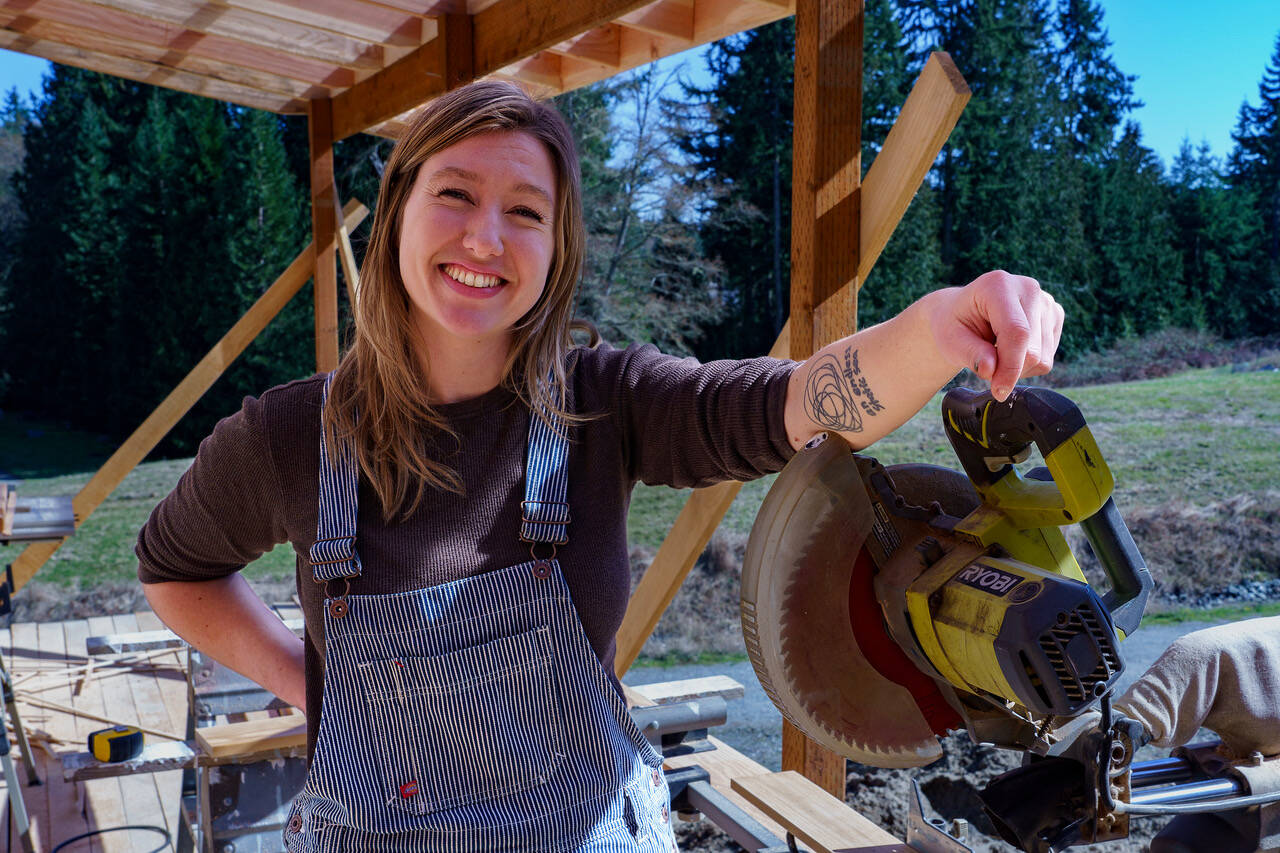Langley resident Gabbi Korrow has accomplished what may seem like a pipe dream to most young people these days.
The 29-year-old flower farmer officially became a homeowner last year after 10 months spent building her own digs. Her humble 700-square-foot abode, which she designed, consists of two bedrooms, one bathroom and a large, social kitchen which flows easily into a television-free living space. A loft accessible by ladder and a partially covered porch allow her to pursue her hobbies of art and music in her free time.
After years of eclectic living situations, she resides in a space that is all hers. She credits her willingness to learn how to construct a home, her resourcefulness in finding secondhand materials and the pure luck in discovering someone willing to sell her the lot as factors that all made homeownership possible.
“It feels like this little miracle window opened up for being able to live in Langley at all, around South Whidbey, let alone be able to own my own home and not just be stuck renting spaces and having them sold out from under you or having rotating roommate situations,” Korrow said.
She acknowledges that she is metaphorically standing on the shoulders of several community members to make this happen. Her new home is part of an intergenerational cohousing community her parents helped found called Upper Langley, where the amount of equity that the houses and land can gain is limited and deed restricted in order to remain permanently affordable. Residents are required to meet certain income qualification standards of modest means, and houses must be 975 square feet in size or less.
Korrow grew up in a 500-square-foot home on an organic farm in Kentucky, so she is no stranger to small spaces.
“I think there’s something about small spaces that you have to learn how to coexist with each other,” she said. “I think it really helped teach me how to be collaborative with people because you don’t have the luxury of sprawling out and not seeing each other, hearing each other for long periods of time.”
Over the years she’s had a number of alternative living situations, from a renovated travel trailer to a dining room in a house shared by five other roommates.
In building her own home, she spent time learning the tools of the trade from her father, Chris Korrow, who is a contractor that has done work on the cohousing project before.
“She basically was pretty green,” Chris Korrow testified.
Gabbi Korrow remembers being afraid of using certain tools at first, like the chop saw. Knowing what type of screws or plywood to buy felt like a foreign concept.
“It has been really empowering, especially stepping into male-dominated spaces, going to Hansen’s and making my lumber order,” she said.
She and her father hadn’t been planning to install drywall themselves, but had to change their plans when inflation and labor costs put the price beyond what they had budgeted for someone else to do it. Korrow said it was one of the hardest things she’s ever done. She bought a used drywall jack and got to work.
“Thank god for Drewslist,” she said, referring to the email service run by Drew Kampion that operates like a South Whidbey version of Craigslist.
Like the drywall jack, many of the materials used to build her home were upcycled. The house’s trim came from old fencing that a neighbor found. A thin, plastic type of compound that resembles granite in appearance makes up the kitchen countertops. Some of the cabinets were salvaged from a kitchen remodel project. Korrow’s natural knack for thriftiness came in handy and originates from her humble upbringing in Kentucky.
“We had all the material to make the things that made life really fantastic and rich,” she said. “And I feel that way about this place in a lot of ways.”
Though she had to make some sacrifices during construction to fit her budget of about $100,000 – such as larger bedrooms or genuine granite countertops – she is ultimately overjoyed with the end result. She hosted the entire neighborhood last Thanksgiving, and friends and family often come to stay over.
“I have a safe, solid foundation within this home and I can be a resource for my community, for people I love,” she said.
A space of her own has provided other uses. Korrow recently completed her certification in emotional freedom technique, a holistic practice that involves tapping acupressure points on the body. She saw her first client in her home a couple of weeks ago.
She hopes to complete outdoor landscaping and install solar panels on the roof next.
“When you do everything yourself, when it’s not done or something fails, I only have myself to blame,” she said. “My sink started leaking a few months ago and I was like, ‘Okay, gotta get out my plumber’s tools.’ Part of me wishes that I didn’t know, and I could just call somebody instead of watching YouTube videos laying under my sink.”
Korrow is willing to share her expertise and experience contributing her own labor with other young people currently pursuing homeownership. She is excited to speak to her peers and others in the workforce about the creative pathways that might take, while at the same time recognizing that the circumstances surrounding her own situation are not the most common on South Whidbey, where there is a shortage of affordable housing.
“I think there are ways to go about it, and it’s cool living in a place like this where there are so many incredible social investors,” she said. “We can be creative and educated about how to finance things and our own capacity as learners to situation our lives to a way where we can put sweat-equity into things or have the confidence to look up electrical code.”



